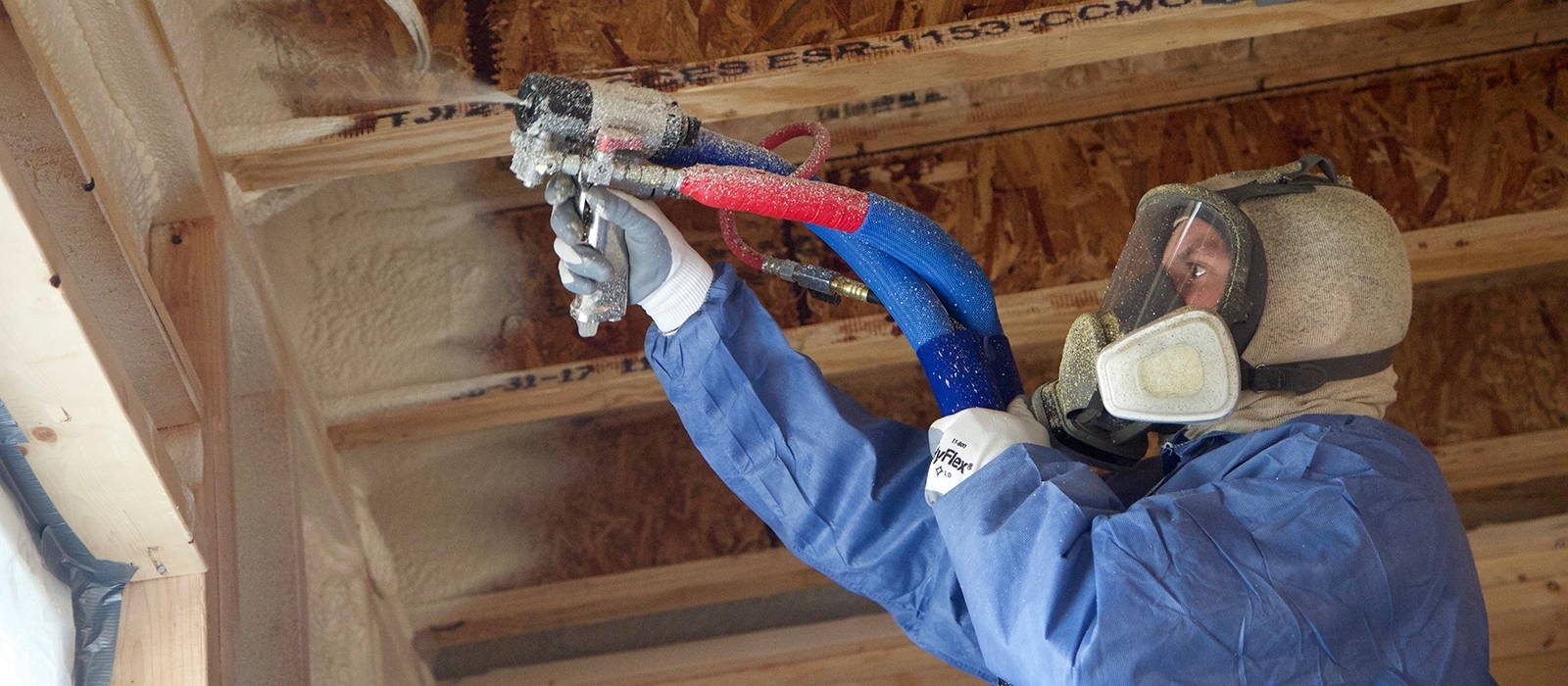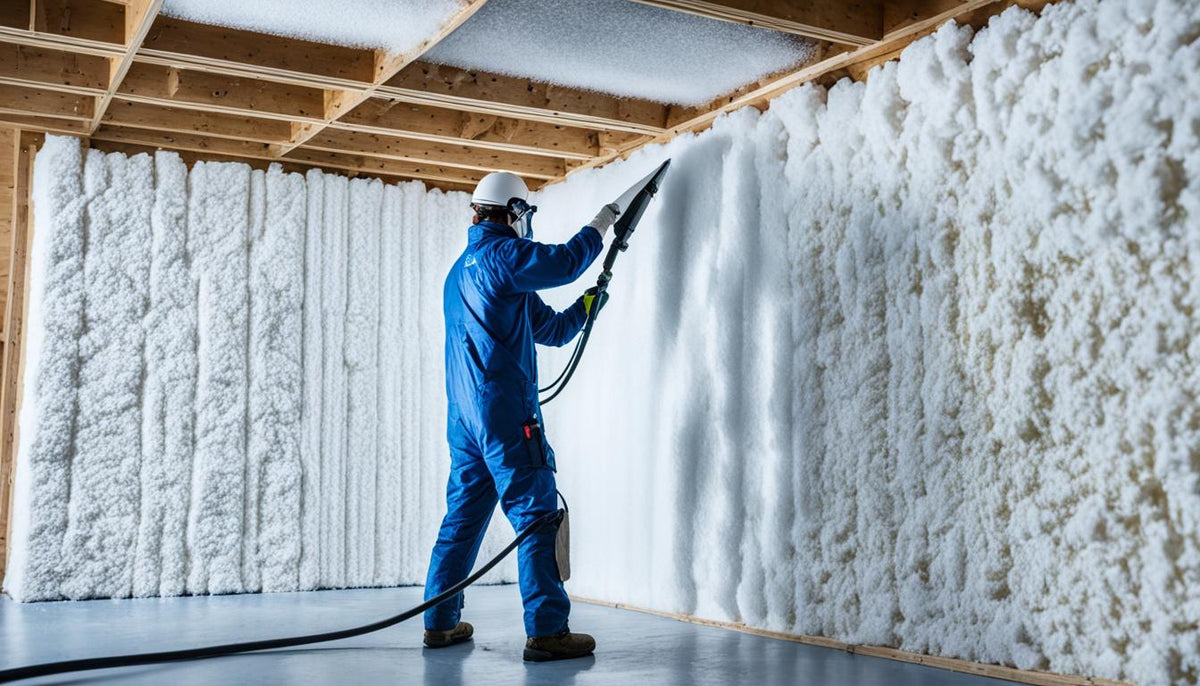Picking the Right Sort Of Spray Foam for Your Insulation Demands
Picking the Right Sort Of Spray Foam for Your Insulation Demands
Blog Article
Spray Foam: The Ultimate Service for Air Sealing and Insulation
Spray foam insulation has emerged as a leading service for effective air securing and thermal insulation, providing an unique mix of residential properties that establish it apart from conventional techniques. Recognizing the full extent of its benefits, setup processes, and comparisons with various other insulation kinds is important for making informed choices.
What Is Spray Foam?
Spray foam is a flexible insulation product that combines the concepts of air sealing and thermal resistance to boost energy efficiency in structures. Made up largely of polyurethane or various other similar substances, spray foam is used as a fluid that increases upon contact with surface areas, producing a strong, constant layer of insulation. This special property allows it to load gaps, cracks, and voids that typical insulation products may ignore, giving a superior air seal.
There are 2 major types of spray foam: open-cell and closed-cell. Open-cell spray foam is lighter and a lot more versatile, offering superb audio absorption and a reduced R-value per inch - Spray Foam. In contrast, closed-cell spray foam is denser, supplying a greater R-value, moisture resistance, and included structural stability to developing components
The application procedure usually includes customized equipment, making certain a smooth application that follows different substratums, including concrete, steel, and timber. This flexibility makes spray foam suitable for both brand-new buildings and retrofitting existing structures. Its capacity to create an impermeable obstacle dramatically adds to minimizing energy usage and boosting indoor air top quality, thereby making it a recommended option among home owners and builders alike.
Advantages of Spray Foam Insulation
Among the most significant benefits of spray foam insulation is its extraordinary ability to produce a constant air barrier, which effectively reduces power loss. Unlike traditional insulation materials, spray foam expands to fill up cracks and spaces, making certain that air leakage is dramatically reduced. This characteristic not just boosts energy efficiency but likewise leads to reduce energy expenses in time.
In addition, spray foam insulation offers premium thermal resistance, adding to a much more steady indoor environment. Its high R-value per inch enables effective insulation in constrained spaces, making it optimal for attic rooms, walls, and crawl rooms. The moisture-resistant buildings of spray foam help prevent mold and mildew development, promoting much healthier living problems.
One more critical advantage of spray foam insulation is its sound-dampening qualities (Spray Foam). It properly minimizes noise transmission in between spaces, developing a quieter and a lot more comfortable home environment. The durability of spray foam likewise attracts attention, as it does not sag or settle with time, keeping its performance throughout its life expectancy
How Spray Foam Works
Understanding how spray foam insulation functions is essential for valuing its effectiveness in air securing and thermal resistance. Spray foam insulation contains 2 key elements: isocyanate and polyol resin. When these elements are mixed, they undergo a chain reaction that triggers the material to expand swiftly, producing a thick foam that loads gaps, tooth cavities, and cracks.
As the foam increases, it sticks to surfaces, forming a closed seal that substantially lowers air seepage. This characteristic makes spray foam insulation very effective at preventing drafts and moisture penetration, which can result in energy loss and damage in time. In addition, the closed-cell variant of spray foam offers exceptional thermal resistance as a result of its stiff structure, properly minimizing warm transfer.
The one-of-a-kind properties of spray foam allow it to satisfy irregular surfaces, making sure detailed protection and a smooth barrier. As an outcome, spray foam insulation not only improves power efficiency yet likewise adds to enhanced interior air high quality by lowering the build-up of pollutants and allergens. Eventually, recognizing the technicians behind spray foam highlights its role as a remarkable choice for insulation and air sealing in both domestic look at here and commercial moved here applications.
Setup Refine Review

Before installment, the space must be sufficiently cleaned and prepped, making sure that surfaces are devoid of debris, dirt, and moisture. This step is vital because pollutants can compromise adhesion and total efficiency. When the location is prepared, the application entails blending both components of the spray foam, which broadens upon get in touch with and fills gaps properly.
Educated professionals ought to conduct the installation, utilizing customized devices to ensure uniform insurance coverage and optimum density. Safety and security precautions, including using protective gear and guaranteeing proper air flow, are imperative throughout this procedure. After application, the foam usually remedies rapidly, creating a solid obstacle that improves energy effectiveness.
Contrasting Spray Foam to Traditional Insulation
When examining insulation alternatives, spray foam insulation stands apart in comparison to conventional products such as fiberglass and cellulose. One of the main benefits of spray foam is its remarkable air securing capabilities. Unlike fiberglass and cellulose, which can allow air seepage, spray foam expands upon application, loading crevices and gaps to develop an airtight seal. This leads to boosted energy performance, as less heated or cooled air escapes the home, causing lower utility expenses.
In addition, spray foam provides a greater R-value per inch than standard insulation types, providing more effective thermal resistance in a thinner account. This particular is particularly valuable in spaces with minimal tooth cavity depth. Furthermore, spray foam is resistant to wetness and mold and mildew development, which can be a significant worry with cellulose and fiberglass, especially in damp atmospheres.
Nonetheless, spray foam insulation typically lugs a greater upfront cost than its typical equivalents. Property owners should evaluate this initial investment against long-lasting power savings and efficiency advantages. Ultimately, while both insulation kinds offer their objective, spray foam becomes an advanced service for contemporary insulation requirements, particularly in terms of air sealing and thermal effectiveness.

Final Thought
In summary, spray foam insulation stands for a very reliable option for accomplishing ideal air sealing and thermal resistance. Its distinct residential or commercial properties, consisting of dampness resistance and noise dampening, make it ideal for various applications in both new constructions and retrofitting projects (Spray Foam). Although the preliminary expenses may be greater compared to traditional insulation products, the long-lasting benefits, such as substantial power savings and enhanced interior air high quality, justify the investment and highlight its value in modern structure practices.
Spray foam insulation has arised as a leading option for effective air securing and thermal insulation, providing an unique mix of residential properties that set it apart from standard techniques.Spray foam is a functional insulation material that incorporates the principles of air securing and thermal resistance to enhance power efficiency in structures.When reviewing insulation choices, spray foam insulation stands out in contrast to conventional products such as fiberglass and cellulose. Ultimately, while both insulation kinds serve their function, spray foam arises as a more innovative option for great site modern insulation requirements, specifically in terms of air sealing and thermal performance.
In summary, spray foam insulation represents a very effective option for attaining optimum air sealing and thermal resistance.
Report this page